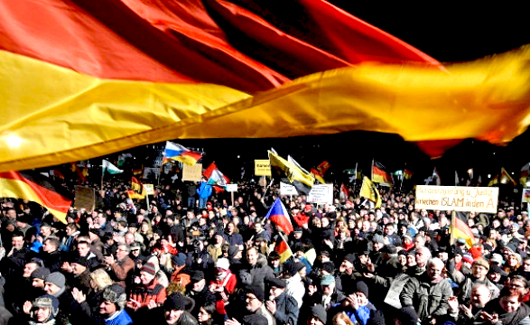
Berlin, Jan 19: German authorities have banned a rally by the anti-Islamic PEGIDA movement in the eastern city of Dresden today, saying they have "concrete" information that Islamist militants plan to attack the weekly demonstrations.
The federal and state police agencies had received information that radical Islamists were planning to mix with demonstrators and attack one of the leaders of the right¬wing Patriotic Europeans Against Islamisation of the West (PEGIDA), which has been organising the Dresden rallies since September.
"In our assessment of the situation, we believe that there is a concrete threat of a terror attack," Dresden's police commissioner Dieter Kroll said yesterday.
Informations received by the authorities indicated that one of the PEGIDA leaders and the people around him were being targeted for a terror attack, Kroll said in a statement.
Kroll, however, said there were no specific information about the suspected terrorists or the nature of the attacks they were planning.
The anti¬Islam rally in Dresden to protest against the "Islamisation of Germany" and the government's asylum policy have been drawing a number of supporters in spite of appeals to the public by Chancellor Angela Merkel and other leaders to stay away from it.
Police estimated that a record number of over 25,000 people attended the rally last Monday and its organisers were expecting a much bigger crowd today.
According to police, the suspected attackers have been asked in a message in Arabic sent from a Twitter account to "mix with the demonstrators to carry out an attack on one of the organisers of the PEGIDA demonstrations."
Besides the anti¬Islam demonstration, a counter¬rally planned by opponents of PEGIDA in Dresden today also has been banned.
Germany's intelligence agencies have received warnings from their partner services abroad that Islamist militants were planning attacks on the central railway stations in Berlin and in Dresden as well as on the PEGIDA demonstrations.
Their warnings were based on information gained by intercepting telephone and e¬mail communications between suspected radical Islamists known to the authorities and international terror networks, media reports earlier said.
The latest terror warnings come close on the heels of the arrests of two Turkish men during a raid at eleven houses in different parts of Berlin on Friday.
The Turks were charged with planning a major terror attack in Syria, supporting Islamic State terror group by recruiting fighters, and organising and financing their travel to Syria.
The state prosecutor in Berlin said it has no information that the two men were planning any terror attacks in Germany nor they were linked to the terror attacks in Paris, which killed 17 people in three days.





Comments
Add new comment